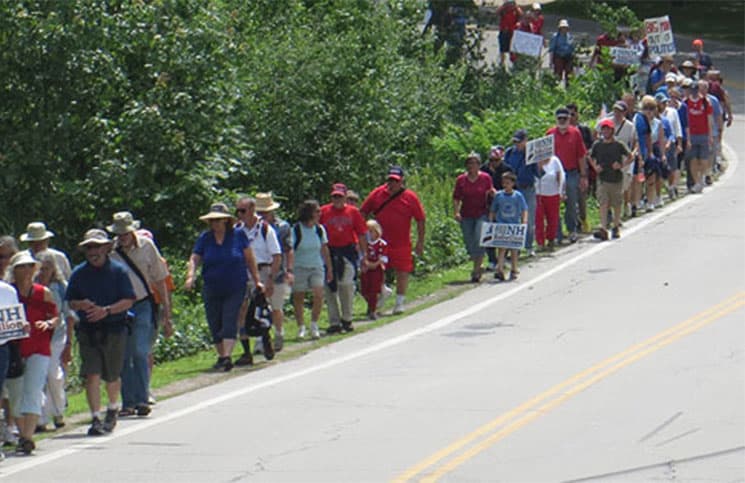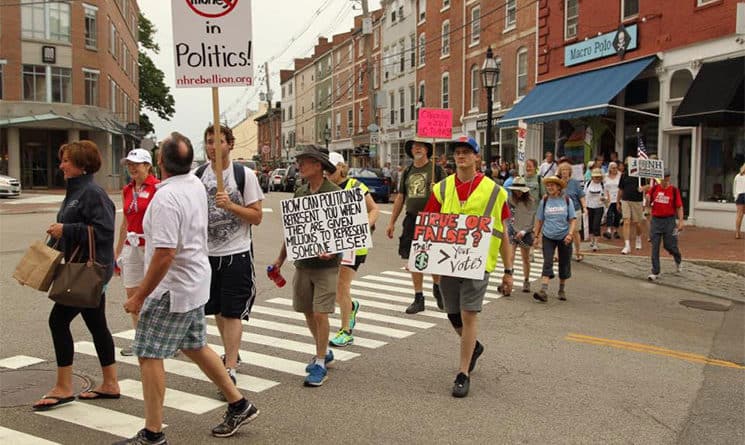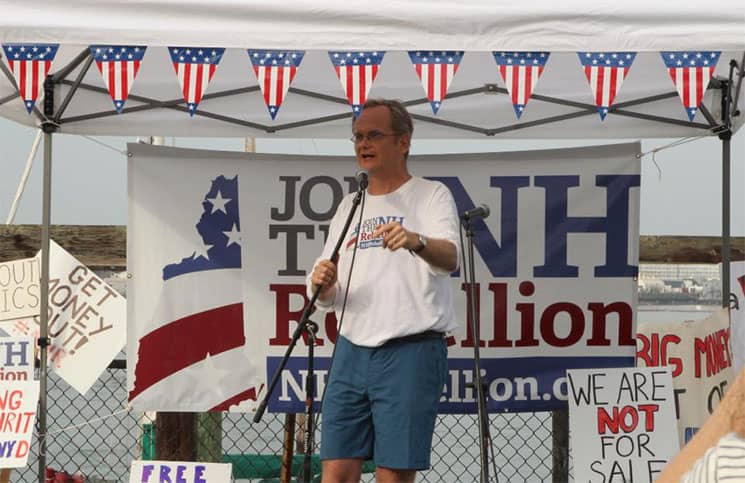In late 2013, a survey conducted by the Global Strategy Group found that 96 percent of Americans think it’s important to reduce the influence of money in politics. But only 9 percent felt it was likely that anything would be done about it any time soon.
Shortly after that survey was conducted, in January of 2014, more than 200 people took part in the first NH Rebellion march, a 185-mile trek from Dixville Notch to Nashua. Since then, “Granny D walkers” have marched a combined total of more than 40,000 miles across the state, all in an effort to raise awareness about the corrupting influence of big money in politics.
In the summer of 2015, a CBS News/New York Times poll found that 39 percent of Americans are optimistic that changes will be made to improve the way campaigns are funded. That’s more than four times the percentage of optimism seen just a year and a half earlier. To Olivia Zink, executive director of Open Democracy, that progress is evidence that events like the NH Rebellion marches are effective. But much work remains to turn that optimism into meaningful change, Zink said.
“I think our system fundamentally has flaws,” she said. “We have a system of corruption, a system of bribery when it comes to how our public policy is made.”
The next NH Rebellion march takes place on Saturday, July 9, in Portsmouth. Walkers will set out from Portsmouth High School at 9 a.m. and walk five miles to Fort Constitution for a rally featuring several speakers at noon. A marching band will greet the walkers as they pass through Market Square.

Hundreds of people have walked a combined 40,000 miles across New Hampshire during NH Rebellion walks. courtesy photo
NH Rebellion was inspired by Doris “Granny D” Haddock, a New Hampshire activist (and one-time U.S. Senate candidate) who embarked on a cross-country walk in 1999 to advocate for campaign finance reform. The walk began when Haddock was 88 and concluded more than a year later when she was 90.
Haddock was the founder of Open Democracy, a nonpartisan reform organization based in Concord. New Hampshire Rebellion, which is part of Open Democracy, is supporting the “We the People” reform agenda, a collection of six core reforms to the national campaign finance system.
Those six core reforms include exposing secret donors and requiring transparency in elections; banning bribes from lobbyists and government contractors; banning super PACs and overturning Citizens United; establishing small-donor, citizen-funded elections; ending gerrymandering and modernizing voter registration; and closing loopholes and enforcing campaign finance laws.
“There’s a very small group of people that have funneled lots of money into our elections.” — Olivia Zink of Open Democracy
Zink and others believe such reforms are necessary to prevent a handful of wealthy families from rigging the election process. She cited an analysis of data from the Federal Election Commission showing that more than 60 percent of the money raised by super PACs in the 2012 election cycle came from just 132 donors, each of whom contributed at least $1 million. She also cited a New York Times report from last October indicating that just 158 families had provided nearly half of the early money raised to support presidential candidates in the current election cycle. Those 158 families, along with companies they control, contributed $176 million in the first phase of the campaign, according to the Times investigation.
“There’s a very small group of people that have funneled lots of money into our elections,” Zink said.
She noted that special interests have influenced national debates on a wide range of issues, from gun control to tax policy.
And it’s not only a problem at the national level; big money seeps into state races as well. With a high-profile race for U.S. Senate and a wide-open race for governor looming in New Hampshire, Zink said she expects lots of money to pour into Granite State campaigns. She noted that two gubernatorial candidates have already raised a combined $1.2 million.
Late last month, the political action committees of gubernatorial candidates Colin Van Ostern and Mark Connolly, both Democrats, filed early campaign finance reports. Van Ostern, currently an executive councilor, had raised nearly $794,000 (plus about $62,000 that carried over from a previous campaign). About 27 percent of the contributions came from outside New Hampshire.
Connolly, a businessman who lives in New Castle, reported just shy of $412,000 in contributions, including a loan from himself of well over $100,000.
None of the other candidates for governor filed an early finance report.
Zink said campaign finance reform is a bipartisan issue supported by voters of many political persuasions.
“When you talk with regular voters, whether they’re Democrats or Independents or Republicans, the regular citizens are fed up with a system where they can’t afford to buy the lobbyists,” she said.
A bipartisan group will speak at the rally on Saturday, including Joe Magruder, a former editor for the Associated Press of New Hampshire and an advisory board member with Open Democracy; John Rauh, founder of Americans for Campaign Reform; Betty Tamposi, former assistant secretary of state under George H. W. Bush; and NH Rebellion founder Lawrence Lessig, a Harvard Law professor and political activist.
The New Hampshire Rebellion walk takes place Saturday, July 9, beginning at 9 a.m. at Portsmouth High School. To register, visit walk.nhrebellion.org.


